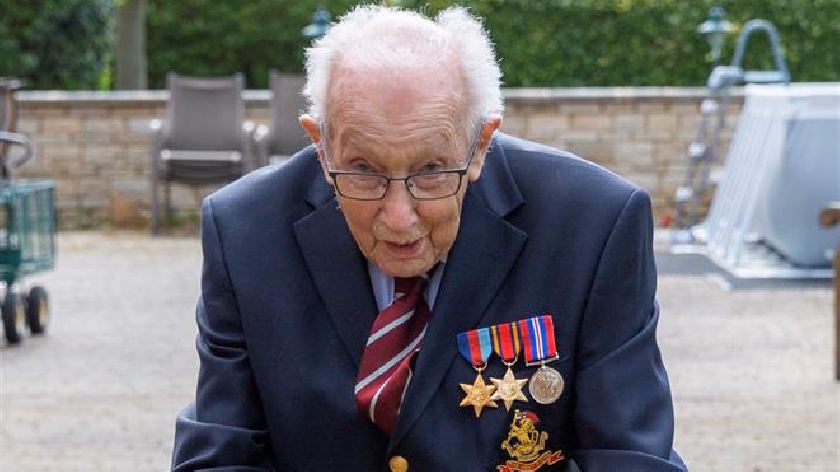Captain Tom Moore’s daughter and son-in-law had a “pattern of behaviour, which saw them “repeatedly benefitting personally” from their involvement in the running of the charity set up his name, according to the Charity Commission.
The regulator found “repeated instances of misconduct and/or mismanagement" by the charity’s former trustee and chief executive Hannah Ingram-Moore, and her husband and former trustee Colin Ingram-Moore.
This included direct and indirect benefit from the couple’s private companies’ links to the late record-breaking fundraiser’s charity.
Among the highest profile “failings” of the couple was to use the charity’s name to build a spa pool at their home and implying that this would be used by the charity. They did this without informing other trustees or seek their consent and the building had to be subsequently demolished by order of their local authority.
The regulator's investigation also found that the couple profited from sales of Captain Tom’s autobiography Tomorrow will be a good day.
Those that bought the book “would understandably feel misled” that its sale did not benefit the charity “given that statements were made which implied donations from sales would be made”, said the Commission.
Hannah Ingram Moore was also criticised for making “disingenuous” claims that she had not been offered a six-figure salary as CEO. The regulator has seen written evidence that she had expected to receive £150,000 remuneration package for the role. Also, the Commission notes that it had blocked the salary request.
Awards fee
Another concern was Captain Tom’s daughter retaining £18,000 fee for judging and presenting an award named after him.
“While she claims she undertook the engagement in a personal capacity, the inquiry does not agree and found no evidence that supports her position. Mrs Ingram-Moore committed the charity’s resources to the event without the non-conflicted trustees’ knowledge or consent,” said the regulator.
Meanwhile, the handling of intellectual property rights owned by the Ingram-Moore family were offered to the charity for its use without appropriate agreements in place. This “led to confusion and possible financial losses to the charity”.
Earlier this year the Commission announced that both Hannah Ingram-Moore and her husband had been banned from charity leadership roles for 10 and eight years respectively.
It emerged last year that the charity is closing down after already shutting down its funding and donation channels.
Captain Tom Moore became famous during the Covid pandemic when he undertook a sponsored walk around the garden of his care home as he approached his 100th Birthday.
He raised a record £29m for NHS Charities Together and was knighted for his achievements. Captain Tom passed away in February 2021.
“Captain Sir Tom inspired a nation and reminded us what service to others can achieve even in the most challenging of times,” said Charity Commission chief executive David Holdsworth.
“His determined fundraising efforts, and the incredibly generous public response, brought a smile and hope to many of us during the pandemic.
“Sadly, however, the charity set up in his name has not lived up to that legacy of others before self, which is central to charity.”
Legal expert’s view
The Charity Commission’s report “provides a compelling guide” for “budding philanthropists” of “what not to do”, said Liz Brownsell, head of charities and partner at law firm Birketts.
“It details numerous breaches of charity law, repeated failures to identify and manage conflicts of interests and unauthorised personal benefit, she said.
“The findings relating to Captain Tom's books make for particularly uncomfortable reading, with evidence of actions having been taken by the Ingram-Moores that muddied the waters regarding how the charity would benefit from the book sales when, in fact, the charity has not financially benefitted at all.
“The Commission's finding that this 'has or is likely to have damaged public trust and confidence in the charity and charities generally' coupled with the significant financial benefit to the family from those book sales will have been major factors in the Commission's decision to disqualify the pair.
She added: “The biggest mistake made by the family was to try to commercialise the brand at the same time as setting up the charity and this is supported by the findings of the report.
“The Commission criticised the 'lack of clear distinction between the fundraising activity of the charity and the profit-making activity of the companies involved'.
“It is a theme that runs throughout every finding of mismanagement: the family sought to privately benefit in parallel with running the charity - a very fine balancing act that they did not manage well.”
Latest News
-
MPs accuse Charity Commission of ‘deliberately’ preventing them accessing sexual abuse case reports
-
CEO at governance row hit charity steps down
-
Animal welfare charity staff being balloted over strike action
-
Friday funding roundup - 5 September
-
Three in four UK firms ‘do nothing to support charities’
-
Probe launches into foodbank over information it submitted to funder
Charity Times video Q&A: In conversation with Hilda Hayo, CEO of Dementia UK
Charity Times editor, Lauren Weymouth, is joined by Dementia UK CEO, Hilda Hayo to discuss why the charity receives such high workplace satisfaction results, what a positive working culture looks like and the importance of lived experience among staff. The pair talk about challenges facing the charity, the impact felt by the pandemic and how it's striving to overcome obstacles and continue to be a highly impactful organisation for anybody affected by dementia.
Charity Times Awards 2023
Mitigating risk and reducing claims

The cost-of-living crisis is impacting charities in a number of ways, including the risks they take. Endsleigh Insurance’s* senior risk management consultant Scott Crichton joins Charity Times to discuss the ramifications of prioritising certain types of risk over others, the financial implications risk can have if not managed properly, and tips for charities to help manage those risks.
* Coming soon… Howden, the new name for Endsleigh.
* Coming soon… Howden, the new name for Endsleigh.
Better Society

© 2021 Perspective Publishing Privacy & Cookies











Recent Stories